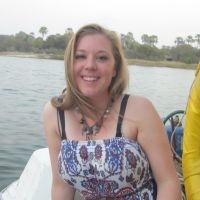Kaylyn Kretschmer, Artsci’09, has always been interested in working for the United Nations. So when an internship opportunity came up through the United Nations Professional Placement (UNPP) program to work in Zimbabwe, she was able to successful raised the money to cover her expenses. She has been in Africa for several months now and is enjoying the experience.
 Why did you want to join the United Nations Professional Placement (UNPP) program?
Why did you want to join the United Nations Professional Placement (UNPP) program?
For as long as I can remember, I’ve been extremely passionate about humanitarian affairs and the work of the United Nations. Throughout my time at Queen’s University, I realized how essential it is to directly engage in those fundamental issues, which you believe in, because that is how you create the change you want to see in the world. The UNPP program gave me this opportunity as well as to gain rich experience as a young professional. Moreover, I’ve always dreamed of working in Africa and being able to explore the rich cultures and histories.
You were required to raise $10,000 for the internship. Was the fundraising difficult?
Yes – fundraising the full amount of money for my placement was difficult. This was not due to the generosity of Canadians, who are generally very supportive of the program, but rather the very short timeframe I had to prepare before being deployed. I think this is a common experience for many JPCs. Previously, this program was supported by the Canadian government.
What are the roles and duties of your job?
My main role at UN Women is in coordination and gender mainstreaming, however, my role has expanded to include health programming. My major roles and responsibilities are diverse and range from attending and coordinating high-level meetings, research, minute taking, report writing, planning workshops, strategic planning (e.g. the drafting of a UN Country Team Gender Mainstreaming Strategy), and monitoring and evaluation activities.
What is life like in Zimbabwe?
Wow, this is a very difficult question to answer. Life in Zimbabwe is nothing I could have ever imagined. There is an obvious presence of colonial roots, which is clashed against a rich and vibrant traditional culture. There are the modern cities, which in a relative sense are developed: Internet, cellphones, restaurants, clubs, and supermarkets. Disparities and inequalities, however, are pronounced and extreme. There are also the traditional communities living in tribes and surviving off the land in handmade mud huts with thatched roofs. It really makes you reflect upon and reconsider the ideas of “development” and “progress.” On a physical level, the environment is so beautiful and exciting. It is very much living in a wild safari land – especially when you drive a bit out of the city. You would have no problem seeing an elephant, giraffe, or buffalo roaming around naturally – it would be just a regular day here in Zimbabwe.
What would you like to do after your UN internship?
Following this internship, I am hoping to return back to Canada to work in public health promotion and policy development. In particular, I would be very interested in working with marginalized groups at the community level. I learned here how important it is to be directly engaged at the community level with vulnerable groups, in order to truly understand their needs and how to build capacity to address them. Eventually, I would like to pursue a PhD in the social and behavioural sciences and public health.

